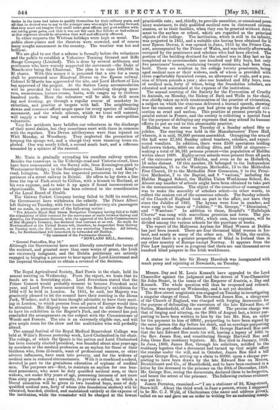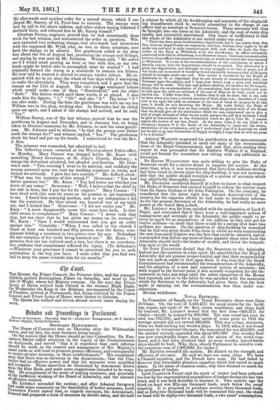Messrs. Day and M. Louis Kossuth have appealed to the
Lord Chancellor against the judgment and the decree of Vice-Chancellor Sir John Stuart, in the cause of the Emperor of Austria, o. Day and Kossuth. The whole question will thus be reopened and reheard. The case was opened on Wednesday, and is not yet decided. The Bow-street magistrate was engaged on Tuesday in investigating a singular charge of fraud. The Reverend James Roe, a clergyman of the Church of England, was charged with forging documents for the purpose of defrauding the executors of the late Edward Roe, of Sutton, Macclesfield, of the sum of 60001. The precise charge was that of forging and uttering, on the 30th of August last, a letter pur- porting to have been written to him by the late Mr. Roe, an order for the payment to him of 60001., purporting to have been signed by the same person the day before his death, and an envelope purporting to bear the post-office endorsement. Mr. George Hartwell Roe said that the late Edward Roe made his will, leaving a legacy of 5001. to the Rev. James Roe, and constituting George Hartwell Roe and John Orme Roe residuary legatees. Mr. Roe died in January, 1859, In June, 1860, James Roe, through his solicitors, notified to the residuary legatees that a document had turned up that might affect the residue under the will, and in October, James Roe filed a bill against George Roe, setting up a claim to 60001. upon a cheque pur- porting to have been drawn by the late Edward Roe on Messrs, Brocklehurst and Co., of Macclesfield, and to have been enclosed in a letter by the deceased to the prisoner on the 30th of December, 1858. Mr. George Roe, seeing the documents, declared them to be forgeries, and hence the arrest of the prisoner. The following curious evidence was pat in : James Perraton, examined.—" I am a stationer of 22, King-street, Snow-hill. About the third week in June a person, whom I supposed to be Mr. C. J. Wyld, of Cheltenham (the name and address given); called on me and gave me an order in writing for an endorsing stamps
He afterwards sent another order for a second stamp, which I em- ployed Mr. Surrey, of 15, Fleet-lane to execute. The stamps were sent by rail to the above address, and other orders having followed I declined them, and referred him to Mr. Surrey himself." Abraham Surrey, engineer, proved that he had occasionally done work for last witness, and remembered the order in question. Wit- ness executed two endorsing- stamps,-and afterwards had interviews with the supposed Mr. Wyld, who, on two or three occasions, sent back the stamps to be altered. The gentleman called at his shop first about the 8th of August last, producing the stamps and fittings, and saying he was sent by Mr. Perraton. Witness said, " He asked me if I would mind passing an hour or two with him, as our two heads might be better able to accomplish what he wanted." I had originally formed the stamp in a semicircle to contain ten letters. He now said he wanted it altered to contain twelve letters. He re- mained with me in my shop the whole of four days while I was trying to make the alterations. Tfiey were completed, and I gave him the stamps on the 11th of August. The two staraps contained letters which would make--one of them " Macclesfield," and the other "Bath." The letters would spell these words, if so placed. I also made him the figures, " 1," " 59." and also " 2." The letter " J " was also made. During the time the gentleman was with me my son William was in the shop, working also. In December last he called upon me again, and I asked if the stamps had arrived, and he said,
Yes.,
William Surrey, son of the last witness, proved that he saw the gentleman in August and December, and in January last, on being taken to Doctors'-commons by Mr. Johnson, he saw the same gentle- man. Mr. Johnson said to witness, "Is that the person your father made the stamps for ?" and witness replied, "Yes." The gentleman shook his head and put up his hands. I understood he was the Rev. J. Roe.
The prisoner was remanded, but admitted to bail. The following scene occurred at the Worship-street Police-office,
on Monday. Mary Connor was charged before Mr. Knox with assaulting _Henry Grosvenor, at St. John's Church, Hackney ; a charge the defendant admitted, but pleaded justification. Mr. Gros- venor said : " This morning I went to he married, and suddenly the woman pounced upon me, tore my wedding waistcoat in twain, and kicked me seriously. I. gave her into custody." Mr. Safford, clerk : " What was the occasion of this attack ?" Grosvenor : " You had better question her." Mr. Knox : " You had better say whetheryou know of any cause." Grosvenor : " Well, I believe that the child by her side is mine, but I pay her for its support." Mary Connor: "I have lived with this man six years on his promise to act honourably to me. I found him marrying another, and in my indignation I did tear his waistcoat. He then struck me, knocked two of my teeth out, and I kicked him." Grosvenor : "I did not strike you." Mr. Knox : "A most disagreeable scene this must have been. Is that child sworn to complainant ?" Mary Connor : "I never took that
.step, but can show that he has given me money on its account."
Mr. Knox : " Then I would recommend that you get an order against him." Constable : "When I was called to the church I found at least one hundred and fifty. persons near the doors, com- plainant holding a waistcoat in two pieces over his arm. • Defendant did not complain of her teeth being knocked out." Mr. Knox : " I perceive that she has suffered such a loss, but there is no corrobora- tive evidence that complainant inflicted the injury. (To defendant) —Whatever your grievance it cannot be permitted for you to seek
i satisfaction in the way you have. I must order that you find two bail to keep the peace towards him for six months."































 Previous page
Previous page